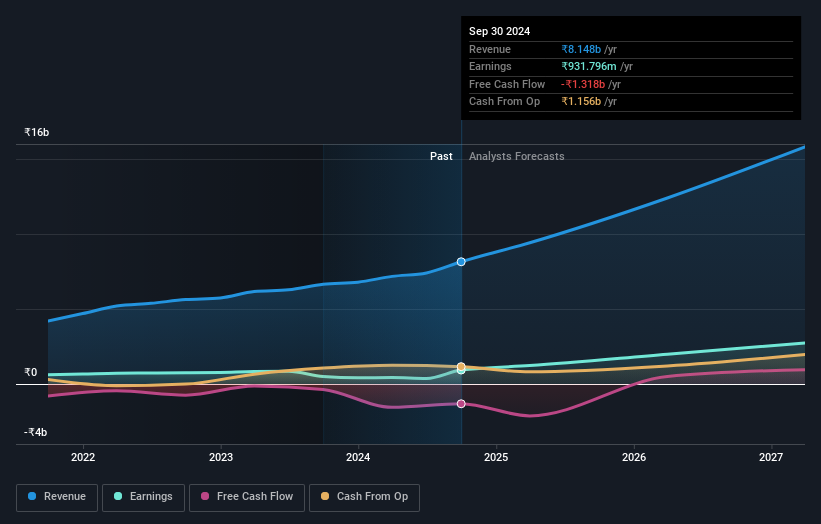Nareshkumar Patel Ami Organics Limited's (NSE:AMIORG) CEO is the most bullish insider, and their stock value gained 6.5%last week

Key Insights
- Ami Organics' significant insider ownership suggests inherent interests in company's expansion
- 51% of the business is held by the top 6 shareholders
- Institutional ownership in Ami Organics is 32%
To get a sense of who is truly in control of Ami Organics Limited (NSE:AMIORG), it is important to understand the ownership structure of the business. With 44% stake, individual insiders possess the maximum shares in the company. In other words, the group stands to gain the most (or lose the most) from their investment into the company.
As a result, insiders were the biggest beneficiaries of last week’s 6.5% gain.
Let's delve deeper into each type of owner of Ami Organics, beginning with the chart below.
View our latest analysis for Ami Organics

What Does The Institutional Ownership Tell Us About Ami Organics?
Institutional investors commonly compare their own returns to the returns of a commonly followed index. So they generally do consider buying larger companies that are included in the relevant benchmark index.
As you can see, institutional investors have a fair amount of stake in Ami Organics. This implies the analysts working for those institutions have looked at the stock and they like it. But just like anyone else, they could be wrong. It is not uncommon to see a big share price drop if two large institutional investors try to sell out of a stock at the same time. So it is worth checking the past earnings trajectory of Ami Organics, (below). Of course, keep in mind that there are other factors to consider, too.

Ami Organics is not owned by hedge funds. Looking at our data, we can see that the largest shareholder is the CEO Nareshkumar Patel with 19% of shares outstanding. With 17% and 4.3% of the shares outstanding respectively, Chetanbhai Vaghasia and SBI Funds Management Limited are the second and third largest shareholders. Interestingly, the second-largest shareholder, Chetanbhai Vaghasia is also Senior Key Executive, again, pointing towards strong insider ownership amongst the company's top shareholders.
On further inspection, we found that more than half the company's shares are owned by the top 6 shareholders, suggesting that the interests of the larger shareholders are balanced out to an extent by the smaller ones.
While studying institutional ownership for a company can add value to your research, it is also a good practice to research analyst recommendations to get a deeper understand of a stock's expected performance. There are a reasonable number of analysts covering the stock, so it might be useful to find out their aggregate view on the future.
Insider Ownership Of Ami Organics
The definition of company insiders can be subjective and does vary between jurisdictions. Our data reflects individual insiders, capturing board members at the very least. Company management run the business, but the CEO will answer to the board, even if he or she is a member of it.
I generally consider insider ownership to be a good thing. However, on some occasions it makes it more difficult for other shareholders to hold the board accountable for decisions.
Our information suggests that insiders maintain a significant holding in Ami Organics Limited. It is very interesting to see that insiders have a meaningful ₹41b stake in this ₹92b business. It is good to see this level of investment. You can check here to see if those insiders have been buying recently.
General Public Ownership
The general public, who are usually individual investors, hold a 22% stake in Ami Organics. While this group can't necessarily call the shots, it can certainly have a real influence on how the company is run.
Next Steps:
While it is well worth considering the different groups that own a company, there are other factors that are even more important. For example, we've discovered 2 warning signs for Ami Organics (1 can't be ignored!) that you should be aware of before investing here.
If you are like me, you may want to think about whether this company will grow or shrink. Luckily, you can check this free report showing analyst forecasts for its future.
NB: Figures in this article are calculated using data from the last twelve months, which refer to the 12-month period ending on the last date of the month the financial statement is dated. This may not be consistent with full year annual report figures.
New: Manage All Your Stock Portfolios in One Place
We've created the ultimate portfolio companion for stock investors, and it's free.
• Connect an unlimited number of Portfolios and see your total in one currency
• Be alerted to new Warning Signs or Risks via email or mobile
• Track the Fair Value of your stocks
Have feedback on this article? Concerned about the content? Get in touch with us directly. Alternatively, email editorial-team (at) simplywallst.com.
This article by Simply Wall St is general in nature. We provide commentary based on historical data and analyst forecasts only using an unbiased methodology and our articles are not intended to be financial advice. It does not constitute a recommendation to buy or sell any stock, and does not take account of your objectives, or your financial situation. We aim to bring you long-term focused analysis driven by fundamental data. Note that our analysis may not factor in the latest price-sensitive company announcements or qualitative material. Simply Wall St has no position in any stocks mentioned.
About NSEI:AMIORG
Acutaas Chemicals
Engages in the research and development, manufacture, and sale of pharmaceutical intermediates in India and internationally.
Exceptional growth potential with flawless balance sheet.
Similar Companies
Market Insights
Community Narratives



